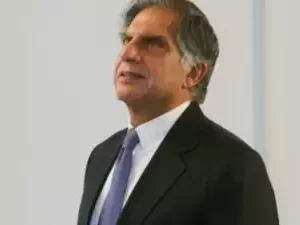Ratan Tata battling for life in Mumbai's Breach Candy hospital
Two days ago, the 86-year-old's social media handle had carried a signed message from him dismissing rumours and asserting that there was "no cause for concern
MUMBAI: The 86-year-old Tata Group patriarch Ratan Tata, who was admitted to the Breach Candy Hospital here on Monday due to age-related ailments, is critically ill.
Tata led the group from March 1991, taking up the mantle from his predecessor JRD Tata, through December 2012. Since then, he has been the chairman emeritus of the nearly $130-billion salt-to-software group.
While Bombay House, the headquarters of Tata Sons, the holding company that runs over 100 operating companies, of which 30 are listed entities, did not respond to calls, its PR firm confirmed to The New Indian Express that Tata's condition is serious.
Significantly, Tata, known for his philanthropy besides being a respected industry leader, himself had scotched what he called 'rumours' on Monday in a post on X, asserting that there was no cause for any concerns about his health and that he was undergoing check-ups for age-related medical conditions.
"I am aware of recent rumours circulating regarding my health and I want to assure everyone that these claims are unfounded. I am currently undergoing medical check-ups due to my age-related medical conditions," asserted Tata, who led the Tata Group from March 1991 to December 2012 as chairman of Tata Sons.
There is no cause for concern. I remain in good spirits," he said, requesting the public and media to refrain from "spreading misinformation".
Under his 22 years of chairmanship, the group had a runaway growth led by a slew of acquisitions overseas. The first was the takeover of British firm Tetley Tea by the group firm Tata Tea in 2000 for $450 million.
That was followed with a much larger takeover of the British steel giant Corus Steel for $8 billion (6.2 billion pounds) in 2007, which has been a heavy drag on the group even today primarily because of the regulatory changes in Europe and Chinese dumping. Then came the JLR buyout from Ford England in 2008 for $2.3 billion, which has been a huge success and now fetches close to three fourths of the Tata Motors revenue and profit.
These three British acquisitions made the Tata group the largest employer in the island nation’s manufacturing sector.
Also, under his watch the group cash cow Tata Consultancy Services has become the country’s largest software company, ahead of Infosys and Wipro, and with nearly Rs 2 trillion in annual revenue and around Rs 60,000 crore in annual profit. It employs over 6 lakh from across 135 nationalities
The man who loved fast cars and flying his own plane, gave the common Indian a unique product -- the Rs 1-lakh car, the Tata Nano, in 2010.
Tata was born on December 28, 1937 to Naval Tata and Soonoo Commisariat. He had a rough childhood as his parents separated when he was all of seven, and was raised by his grandmother Navajbai Tata, along with his younger brother Jimmy.
He completed his degree in architecture in 1962 from Cornell University, New York, and got an advanced management programme from Harvard Business School in 1975. On the advice of JRD Tata, he turned down a job offer from IBM to join the family business
There were also downsides during his tenure. Under his watch, the conglomerate ended up sitting on a debt pile of $26 billion which caused concern among some investors. Tata’s telecom business was also under severe strain in the wake of the 2G scam.
He stepped down on December 28, 2012 on turning 75, appointing Cyrus Mistry as his successor.
The group's aggregate sales at the end of 2011-12, around the time he stepped down, were at Rs 4.51 trillion. This was 43 times the turnover in 1992-93, when he first took over as chairman
Tata continued to head the main two Tata Trusts, Sir Dorabji Tata Trust and Sir Ratan Tata Trust, as well as the major holding company, Tata Sons. Together, he holds 66.8 percent in them.
He was in the thick of controversy when Nira Radia, the group’s PR head, allegedly revealed sleazy deals that the group did under his watch especially in the telecom space.
Ties between Mistry and Tata soured later and the former was forced out in a boardroom coup on October 24, 2014. The manner in which Mistry was ousted dented Tata's image as well as that of the group.
Following this, Tata again took up the mantle of the group till N Chandrasekaran of TCS was appointed as the Tata Group chairman in January 2017.
